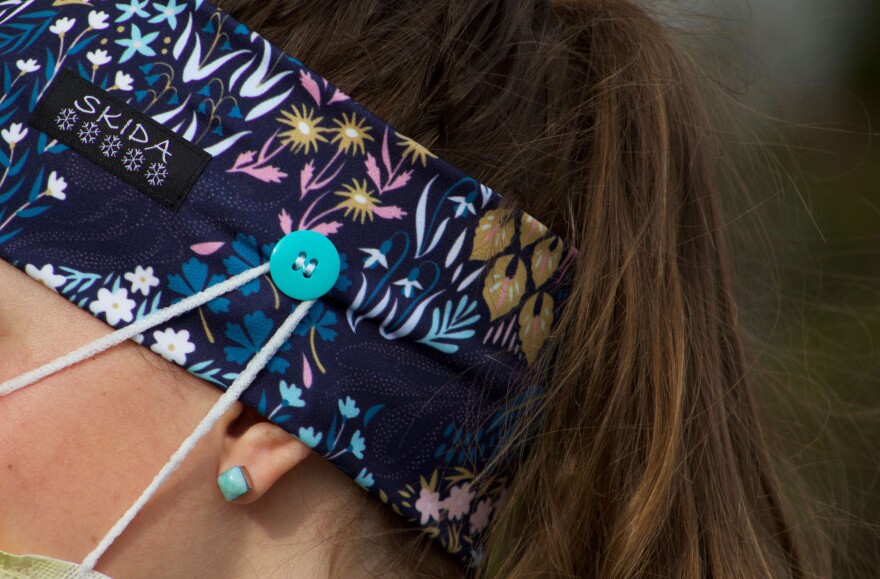Young health care workers' early years are being defined by a pandemic that wasn’t part of their classes or in their textbooks. VPR spoke with three health care workers who were all in the beginning stages of their careers when the first cases of the coronavirus hit.
For Annie Graziano, even little things in her daily routine are different — for example, she said she now washes her headbands. The 24-year old University of Vermont Medical Center nurse said she has a whole decontamination process when she gets home.
“During that work week, I just leave my hamper and my towels in the bathroom, and just walk straight in and disinfect my Fitbit, and throw everything just straight in the hamper,” she said.

These are things you don’t learn in nursing school.
"It's been just kind of freaky,” Graziano said, “in your second year of the profession, to work during a global pandemic.”
Also disinfecting and washing headbands is Graziano’s roommate, Scout Hill, also 24 and a nurse at UVMMC. During the peak of the pandemic, Hill’s floor was converted to treat coronavirus patients. It was challenging, Hill said, particularly since there’s still so much unknown about COVID-19.
“Some people are just barely hit by it — like we have people in their late 90s who tested positive for COVID and have no symptoms at all,” she said. “And then we'll have people who are mid to late 40s, who are short of breath just trying to sit up in bed.”
The disease can come quickly, according to Hill. Sometimes a patient would seem fine, and then within 12 hours, they’d be in serious condition.
“So if someone needed a bump of five liters of oxygen within a matter of a 12 hour shift, then they were automatically brought to the ICU, because chances are, they would eventually need to be intubated,” she said.

A few months ago, there was a great deal of uncertainty and worry about the capacity of hospitals to handle a potential influx of patients. The Vermont National Guard built several surge sites in case hospitals were overwhelmed. UVMMC converted three floors to treat coronavirus patients.
But so far, hospitals haven’t been overwhelmed. At the height of the pandemic, UVMMC treated 26 patients.
One of the people who helped treat them is Jess O’Toole, a 26-year-old licensed nursing assistant.
O’Toole had been working at the hospital for a little over six months when her unit became a place for people to wait for their COVID-19 test results.

On the first day, O’Toole was decked out in full protective gear, moving potentially infected patients to her floor.
“It wasn't super complicated, but it again, was very emotional, very hot, not very comfortable,” O’Toole said. “And I just like, felt bad for this individual, whoever it might be, that is alone, and doesn’t know what’s going to happen, and there's this scary virus out there. And they're in the middle of it.”
O’Toole says one of the difficult things was having to limit contact with patients.
“I can't imagine what it must be like to be in this room, and know that people are actively unable to be there as much as they normally are,” she said. “And are like, actively trying not to go in as much as possible, or cluster care, even though it's what's necessary, that just has to be really, really sad.”
Graziano, one of the UVMMC nurses, said even though she felt supported by her co-workers and supervisors, it was still emotionally draining to go in.

“I actually really kind of struggled in the beginning with all this," she said. “I had really crazy amounts of anxiety that I had never experienced before about going into work and I started journaling, and I found that that helps.”
More from The Frequency: A UVM Nurse Chronicles Sadness, Anxiety And Hope As COVID-19 Grips Vermont
Graziano, Hill and O’Toole all say the experience of working through the pandemic has only reinforced their desire to work in health care.
For O'Toole, it also signaled she was on the right career path. Last month she started the nursing program at UVM.
“For some strange reason, it made me feel like what I'm doing is really important and needed, especially now,” she said. “So I'm feeling pretty good about it.”
UVMMC hasn’t had more than two coronavirus patients at a time in the last month. The units that were turned into COVID-19 floors, like O’Toole’s and Hill’s, have been converted back.
Generally, new infections in Vermont have dwindled, but a recent outbreak in Winooski is evidence the virus is still active, and cases could spike again.

And if that happens, Hill and the others say what happened in March has prepared them.
“I feel like if we can get through this, we could probably get through anything,” Hill said.
Graziano and Hill say they’d initially been planning on becoming traveling nurses, but given the uncertainty caused by the pandemic, for now they’re staying in Burlington.






